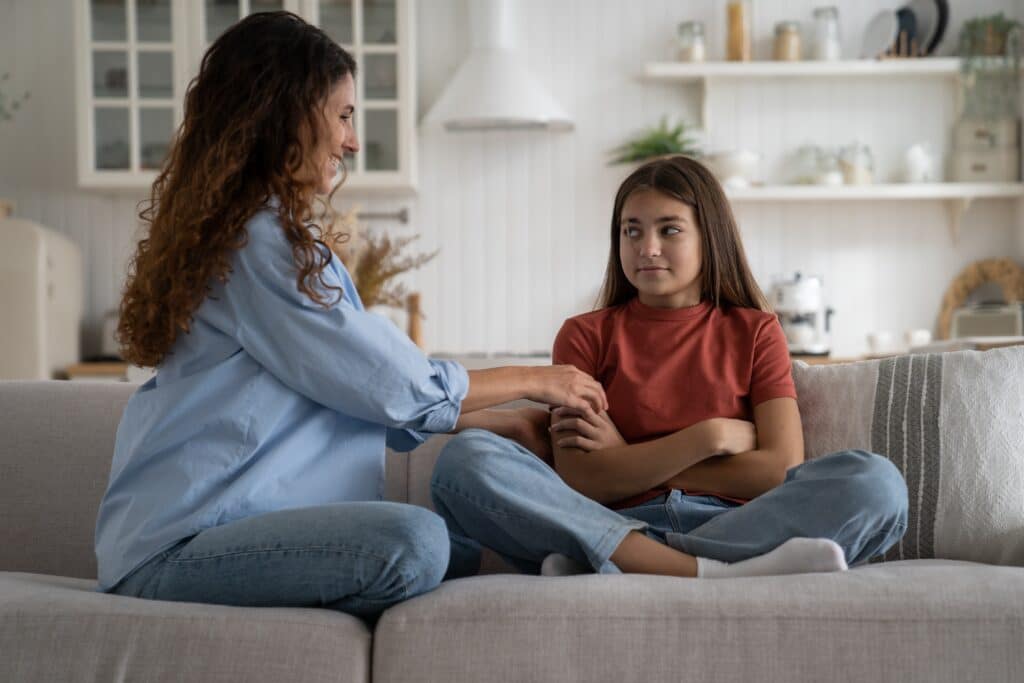Guiding the Journey of Adolescence: A Guide to ‘The Talk’ – Jennifer Oaten

When you are the parent of a teenager, pretty much everything you do embarrasses your son or daughter. I remember as a teenager, my parents drove a brown Kingswood station wagon, and I always wanted them to park down the road! When it comes to having conversations about puberty, relationships and sex, nothing could be more uncomfortable for both the parent and the teenager. However, as a parent, you are one of the most reliable sources of information and one of their most influential role models. Having these conversations will help to ensure they are informed, make good decisions and keep them safe.
I have the privilege of witnessing the transformative journey of our students as they navigate through the stages of adolescence. One pivotal element of this journey is the introduction to the world of sexual education – the ever-so-delicate conversation about ‘the birds and the bees’ or what is also referred to as ‘the talk’.
This conversation, while often considered awkward or difficult, is an indispensable part of your daughter’s growth and understanding of her own body, relationships, and the responsibilities that come with it. It is not just about the mechanics of reproduction but about self-awareness, respect, consent and the values we hold close as a family.
But who and when should we initiate this crucial dialogue? There is no one-size-fits-all answer.

The key is to ensure that the individual is someone your daughter feels comfortable with, someone she trusts and respects.
I have included 9 practical suggestions to help you with approaching ‘the talk’, keeping in mind the importance of accurate information and the need for kindness and understanding. Our goal is to empower you, as parents and guardians, to confidently guide your daughters through this significant milestone in their lives.
Practical tips and strategies to help navigate 'the talk'
1. Start early: It is crucial to start discussing basic concepts with your child at a young age and gradually introduce more complex topics as they grow. By starting early, you provide a strong foundation for comprehensive and gradual learning. This includes teaching appropriate language for body parts and functions and understanding public and private behaviours. Remember, these conversations should be ongoing and adapt as your child develops. Their questions and concerns will evolve with each stage of their growth.
2. Create a safe environment: Creating a safe and non-judgmental environment is crucial. Encourage questions and provide accurate information, even when they are challenging. By being open and honest, we foster a safe space for our daughters to share without fear of judgment. Respect, understanding, and empowering them to have a healthy attitude towards their bodies and relationships are key. Asking questions and listening cultivates connection.
3. Start conversations by using cues: When starting conversations, try using cues from the news, current affairs, social media, advertising, books, TV shows, or movies. These can be opportunities to talk about relationships and sexuality in a relatable way. By connecting the topic to their own experiences, you can help them apply the information in a meaningful way. Remember, it’s better to start small and not overwhelm them with too much information all at once.
4. Promote your values: When you incorporate your values into ongoing conversations, it really helps your daughter develop a strong foundation based on your family’s beliefs and principles. It is all about having a more holistic and values-based understanding of human relationships and sexuality. Take the time to decide what values and messages you want to communicate. Remember, kids won’t necessarily know about your morals, values, and beliefs unless you tell them. And let us not forget, teenagers may have different opinions from your own, so it is important to figure out how we’ll navigate through that.
5. Use appropriate language: When you explain things to your child, it is important to use words that they can understand. Keep it simple and use age-appropriate language so that they can grasp the concepts easily. It is also important to use the correct names for body parts, as using substitute names can confuse them. This way, your child will be better prepared to communicate with parents or medical professionals if they ever have a problem.
6. Respect is key: Respecting ourselves and others is really important. It is all about accepting and embracing the physical differences that come with adolescence and how teenagers react to those differences in others. For example, it is crucial for all children, boys and girls, to understand that menstruation is a natural process.
If young people have a better understanding, we can eliminate any embarrassment or misinformation and raise them to be respectful of their own bodies and the changes that occur. Respecting others creates a sense of acceptance and belonging, which is so important during the teenage years.
7. Importance of relationships: Love is a complex thing. It is hard to define because it varies from person to person. But love is more than just biology. It is that incredible feeling of connection, intimacy, and joy when we are close to someone.
Relationships, commitment, and love itself are important to explore. It is not just about attraction or infatuation. It is about learning to truly love and respect someone and being loved in return.
By focussing on emotions and relationships, we can help teenagers understand sex as a natural part of life. It is about teaching them the difference between healthy and unhealthy relationships. Even failed relationships teach us valuable lessons about what makes a relationship successful.
8. Consent: It is really important to teach your child about consent and personal boundaries. Make sure they understand how crucial it is to respect others’ boundaries and always get consent in any relationship. This helps them develop healthy and respectful attitudes towards others, starting from a young age. Let them know they are in charge of their own bodies, have the right to choose, say yes or no, and make decisions for themselves.
When talking to teenagers, it is essential to discuss equitable relationships, standing up for themselves, handling uncomfortable situations, and effectively communicating these messages. This is especially important for young women.
9. Pornography: Before your child gets exposed to any pornography, it is crucial to make sure they have a solid understanding of healthy and respectful relationships. Whether it happens accidentally or intentionally, encountering explicit content online is bound to happen.
When they hit their teenage years, young people often get curious about bodies and sex, which increases the chances of them seeking answers online. That is why it is important for children to know how to handle inappropriate images and where to find appropriate answers to their questions.
Key areas to cover in your conversation
- Puberty
- Healthy respectful relationships
- Reproduction and pregnancy
- Pornography
- Importance of personal values
- Decision making
- Consent
- Sexually transmitted diseases and contraception
Possible questions to get started..
- What topics are you learning about in Health at school?
- What have you learned at school about …..?
- What do your friends think about ……?
- What do you think about …….?
- What do you think you would do in that situation?
At Santa Maria College, students participate in Health Education from Years 5 – 10 and also the Keeping Safe Child Protection Curriculum (KS:CPC) in Years 5 – 12. The KS:CPC is a respectful relationships and child safety curriculum that teaches all children and young people they have the right to be safe, and they can help themselves to be safe by talking to people they trust.
Parents can partner with the College by having conversations with their daughters about what they are learning in these programs. As parents, guardians, and educators, we play a pivotal role in guiding our daughters through this significant milestone. If we can navigate this journey together by providing support for each other, we will be more successful in navigating this journey.
Remember, the goal is not to have all the answers but to listen, guide, and offer support when your daughter needs it. Each child is unique, and thus, their understanding and readiness for these discussions will differ. Be patient, be kind, and most importantly, be there for your daughter.
Through open communication and mutual trust, we can help our daughters navigate the complexities of adolescence, fostering a strong sense of self-worth and respect for others. After all, our role is not just to educate but to guide them as they develop into empowered, informed, and compassionate young women.

Michelle Attains Lead Teacher Status
Our Head of Professional Learning, Michelle Carrick, recently attained national certification as a Lead Teacher, one of only 64 people nationally to have attained this certification in 2023.

From the President: May 2024
We have some great stories in this month’s blog. Also Look out for information about our OGA Movie Night screening of The Way, My Way.

Lisa Sorger: Sisterhood Network Series
Join us for an inspiring evening at the second session of our Sisterhood Networking Series with Dr Lisa Sorger (Ramakrishnan, 1987).
- Featured
Author: Santa Maria College
Santa Maria College is a vibrant girls school with a growing local presence and reputation. Our Mission is to educate young Mercy women who act with courage and compassion to enrich our world. Santa Maria College is located in Attadale in Western Australia, 16 km from the Perth CBD. We offer a Catholic education for girls in Years 5 – 12 and have 1300 students, including 152 boarders.







